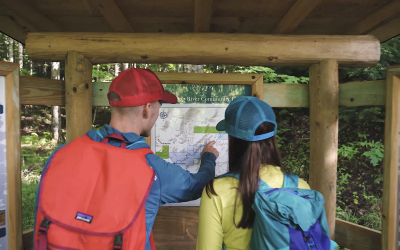When it comes to funding, what’s the bottom line? For many destinations, diversification will help lower the risk of losing a single source of revenue.
As part of our destination marketing webinar series, Destination Think’s Senior Strategic Consultant Aaron Nissen presented research into today’s spectrum of funding models and shared some of the insights from our recent “Leading your destination into the future” whitepaper. His comprehensive summary offers a deep dive into the importance for destinations to demonstrate value and find a stable source of funding.
Watch the full “Opportunities for new business models” webinar or read the highlights below:

Senior Strategic Consultant Aaron Nissen presented and moderated the Cost and Revenue panel at Destination Think Forum 2016.
1) Understand the funding model spectrum:
Many destination marketing organizations (DMOs) receive public funds, but government appropriation is only one possible approach. Some destinations are experimenting with public/private partnerships and industry-led models, which can lead to greater financial stability. Four important destination funding models are:
- Appropriation: This common source of revenue for a destination comes from the government, often in the form of a hotel tax.
- Cost recovery: This model is a growing trend that can help balance tourism business needs with resident needs by contributing to local infrastructure and quality of life.
- Co-funding: In this model, tourism stakeholders match funding provided by the government. Co-funding can help the community direct the vision of the destination.
- Industry-led: Tourism Improvement Districts (TIDs) are one example of this self-governed model. This often involves public-private partnerships that pool funds toward destination marketing, which may include promotion and development by a DMO.
2) Today’s destinations face three core funding challenges:
Challenges vary from destination to destination, but these three challenges were identified during an international collaboration of executive destination marketing leaders.
- A lack of diversified revenue streams within an unstable political landscape.
- A lack of understanding of the value of tourism among stakeholders and in the community.
- A changing industry landscape. This may include geopolitical, economic (the sharing economy, for example), or destination management changes.
3) There are two key outcomes to address these challenges:
- Clearly define the value of tourism with community stakeholders through:
- Advocacy, tourism industry ambassadors and PR,
- Stronger partnerships
- Transparency
- Partner DMOs
- Creating a destination’s long-term tourism strategy with a unified vision.
This means redefining the role of the DMO, which includes diversifying revenue streams through:
- Public/Private Partnerships (PPP)
- Tourism Business Improvement Districts (TBID)
- Non-traditional sources
DMOs also need to manage ongoing change with a leadership role in the tourism industry. Destination marketers should set aside resources to:
- Create an innovation budget for research and development
- Measure the impact of the DMO
Watch the full presentation below to learn more about how the value of tourism relates to funding models, and Aaron’s thoughts on building a DMO from scratch.
Your global destination marketing colleagues discussed their greatest challenges at Destination Think Forum 2016. Download the “Leading your destination into the future” whitepaper to read their insights.










0 Comments